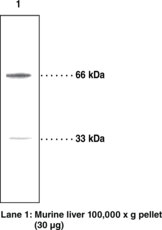| References |
| Synonyms |
- PTEN Induced Putative Kinase 1
- PARK6
- BRPK
|
| Formulation |
Peptide affinity-purified IgG |
| Stability |
1 year |
| Storage |
-20°C |
| Shipping |
Wet ice
in continental US; may vary elsewhere
|
| Specificity |
| Human PINK1 |
+ |
| Murine PINK1 |
+ |
| Rat PINK1 |
+ |
|
Background Reading
Valente, E.M., Abou-Sleiman, P.M., Caputo, V., et al. Hereditary early-onset Parkinson’s disease caused by mutations in PINK1. Science 304 1158-1160 (2004).
Unoki, M., and Nakamura, Y. Growth-suppressive effects of BPOZ and EGR2, two genes involved in the PTEN signaling pathway. Oncogene 20 4457-4465 (2001).
Mammalian Gene Collection (MGC) Program Team. Generation and initial analysis of more than 15,000 full-length human and mouse cDNA sequences. Proc Natl Acad Sci USA 99(26) 16899-16903 (2002).
| Size |
Global Purchasing |
| Trial Sufficient for 3 western blots |
|
| 500 µl |
|
Description
Antigen:
human PINK1 amino acids 484-504 (LVRALLQREASKRPSARVAAN)
·
Host:
rabbit
·
Application(s):
WB and IHC (formalin-fixed paraffin-embedded sections); other applications not tested
·
Phosphatase and Tensin Homolog (PTEN) dephosphorylates lipids such as phosphatidylinositol 3,4,5-triphosphate (PIP3) and its defects contribute to a variety of human cancers. PTEN induced putative kinase 1 (PINK1) was first identified when studying the tumor-suppressive function of the PTEN signaling pathway and is thus believed to be involved in human cancer pathology.1 The mRNA of PINK1 is expressed ubiquitously among adult tissues with most abundant expression in the heart, skeletal muscle, and testis.1 PINK1 is located in mitochondria and its homozygous C-terminus mutation is associated with early onset of Parkinson’s disease.2 Cayman’s PINK1 polyclonal antibody recognizes primarily the full length protein at about 66 kDa in human, murine, and rat tissues. In addition, a truncated form of the protein at about 33 kDa is also detected.3
1
Unoki, M., and Nakamura, Y. Growth-suppressive effects of BPOZ and EGR2, two genes involved in the PTEN signaling pathway. Oncogene 20 4457-4465 (2001).
2
Valente, E.M., Abou-Sleiman, P.M., Caputo, V., et al. Hereditary early-onset Parkinson’s disease caused by mutations in PINK1. Science 304 1158-1160 (2004).
3
Mammalian Gene Collection (MGC) Program Team. Generation and initial analysis of more than 15,000 full-length human and mouse cDNA sequences. Proc Natl Acad Sci USA 99(26) 16899-16903 (2002).
|






